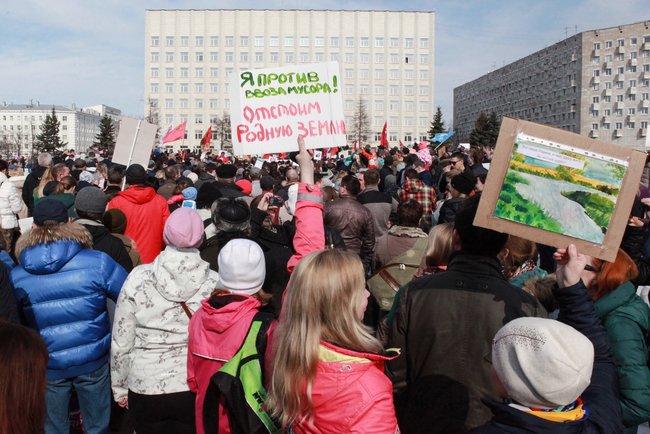The Ingush protest has become an example for all of Russia, but an example is just that, an example for others to follow.
Perhaps not on the same scale, but to a significant degree, we are now witnessing something similar in Arkhangelsk, where several thousand people have taken to the streets to protest the construction of a massive landfill in their region, to which waste from other regions, including Moscow, will be transported.
The difference in size and organization of these protests compared to the one in Magas can be understood and explained – Ingushetia is a very solidary nation with a southern temperament, while Arkhangelsk is a northern, largely depressive region.
This makes it all the more valuable that thousands of people in Arkhangelsk managed to wake up from their slumber, at least when they realized that this was no longer just about “abstractions” (in the understanding of ordinary people, of course), but about their future and that of their children.
In this sense, despite different motivations (territorial in one case, environmental in the other), both actions are united by the fact that the people of these regions are protesting against the way the authorities treat them as mute cattle, for whom decisions can be made about where and how they can graze, what they can be fed and poisoned with, and when they can be sent to slaughter.
Meanwhile, the repression in Ingushetia, the beginnings of which we wrote about earlier, is gaining momentum.
It is encouraging that for the first time the Russian opposition is paying attention to them and showing solidarity with the Ingush protesters. None other than Alexei Navalny, who has not been known for his sympathies towards the Caucasus, called the protests in Ingushetia “the most important thing happening in Russian politics” and dedicated a significant part of one of his programs to them.
In a number of Russian cities, Russian civic activists held a series of solo pickets under the slogan “Today I am Ingush,” not counting spontaneous rallies and pickets by the Ingush diaspora in Russia and beyond.
Against this background, the mood of the “Ingush” authorities is close to hysteria.
The Kremlin’s representative in Ingushetia, General Evkurov, not only calls for the arrest of the organizers and participants of the protest, but also admits to wanting to kill 5-10 thousand of his own (?) compatriots who peacefully protest against his arbitrariness.
It is clear that in this context and with such a mood, the key question for the regime becomes control over the security forces and their willingness to do what Evkurov describes, or what the Assad henchmen did to their people, which is precisely why the Kremlin deliberately supported him.
But it seems that they are not confident.
Moreover, if the refusal of the Ingush policemen, who were promptly fired for it, to disperse their compatriots can be attributed to a high level of national solidarity, then the grumbling that is beginning among the Russian security forces is no less telling.
Recently, for example, a group of former Rosgvardiya employees, who served the regime faithfully for years, recorded a video appeal because they and their families were unnecessarily evicted from the dormitory where they were living.
Of course, we shouldn’t be deceived – we are talking about former employees, whose fate cannot be a lesson to hundreds of thousands of current employees, who are materially dependent on the regime and reason in the spirit of “let you die today, and I will die tomorrow”.
Therefore, the refusal of the Ingush policemen to disperse their people seems to be an exception rather than the rule, but it is still significant.
But the more local protests there are, like in Ingushetia and Arkhangelsk, the more holes the regime will have to fill with loyal security forces, and the more that will require financial resources it is beginning to lack.
And then, who knows, maybe even the employees of Rosgvardiya will start asking themselves more often whether it is worth it to go against their own people for the sake of those who will throw them out on the street tomorrow.

